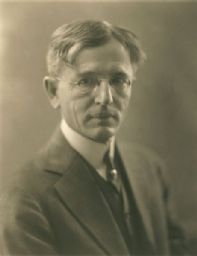Commons, John Rogers 1862 - 1945

John R. Commons in 1919 (WHi-39217)
professor, economist, labor historian, author, b. Hollandsburg, Ohio. He graduated from Oberlin College, Ohio (A.B., 1888; A.M., 1890), and was a student at Johns Hopkins (1888- 1890). He was instructor of political economy, Wesleyan Univ., Middletown, Conn. (1890-1892), professor of sociology at Oberlin (1892-1893), Indiana Univ. (1893-1895), and at Syracuse Univ. (1895-1899). In 1901 he was appointed an economic expert on the U.S. Industrial Commission and in 1902 was assistant secretary of the National Civic Federation. In 1904 he came to Wisconsin as professor of economics at the university, a position that he held until becoming emeritus professor in 1933. An active participant in the affairs of his day, as well as a scholarly observer, he was a member of the Wisconsin Industrial Commission (1911-1913), the U.S. Commission on Industrial Relations (1913-1915), the Wisconsin Minimum Wage Board (1919-1945), and was associate director of the National Bureau of Economic Research (1920-1928), and chairman of the Unemployment Insurance Board of the Chicago Clothing Trades (1923-1925). Working in close cooperation with R. M. La Follette, Sr. (q.v.), Commons helped draft the Wisconsin Civil Service Law (1905) and the Public Utilities Law (1907). In 1913 he testified before the Congressional committee in support of La Follette's bill for physical valuation of railroads by the I.C.C. Recognized as one of the most outstanding scholars in the field of labor history and economics, Commons, like his colleague, Richard T. Ely (q.v.), believed in a theory of gradualness and democratic competition in the labor movement rather than class conflict and revolution. He refused to accept the easy generalizations of the Marxists, and likened the struggle for labor rights to the medieval power struggle that pitted the English nobility and merchants against the sovereign. His emphasis was always placed on collective bargaining and pragmatic compromise. Commons demonstrated this viewpoint in "American Shoemakers, 1648-1895," which appeared in the Documentary History of American Industrial Society. In line with this position, he was a great admirer of Samuel Gompers. An advocate of labor democracy, he opposed dogmatic and deterministic views, and defined the intellectual's role in the labor movement as one of aiding and advising rather than directing or manipulating the laborer. He was author of numerous books, among which are Social Reform and the Church (1894), Proportional Representation (1907), Races and Immi- grants (1907), Legal Foundations of Capitalism (1924), and Institutional Economics (1934). He was one of the principal authors of History of Labour in the U.S. (1918-1935), and was the principal editor of Documentary History of American Industrial Society (10 volumes, 1910-1911). He was president of the American Economic Association (1917), the National Monetary Association (1922-1923), and the National Consumers' League (1923-1935). Madison Capital Times, May 12, 1945; Wis. Mag. Hist., 29; H. W. Spiegel, ed., Development of Econ. Thought (New York, 1952); Whe Was Who in Amer. (1950); J. R. Commons, Myself (New York, 1934).
The Wisconsin Historical Society has manuscripts related to this topic. See the catalog description of the John Rogers Commons Papers for details. See also the John Rogers Commons Account Book. See also the John Rogers Commons Miscellany.
View a related article at Wisconsin Magazine of History Archives.
View newspaper clippings at Wisconsin Local History and Biography Articles.
Learn More
Dictionary of Wisconsin History
Explore more than 1,600 people, places and events in Wisconsin history.
[Source: Dictionary of Wisconsin biography]
